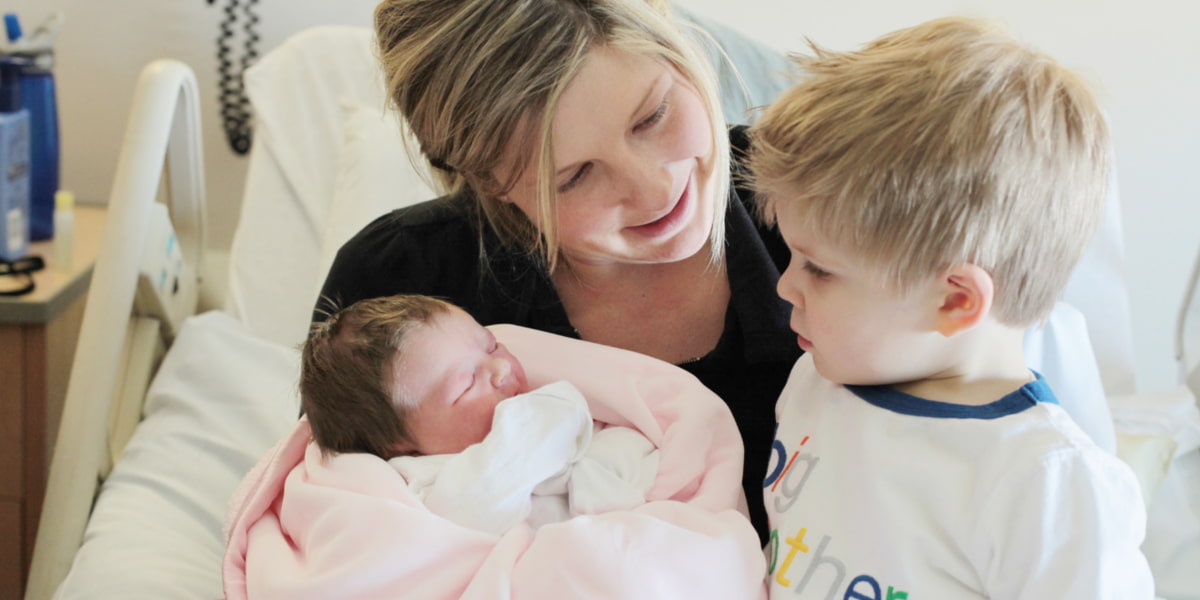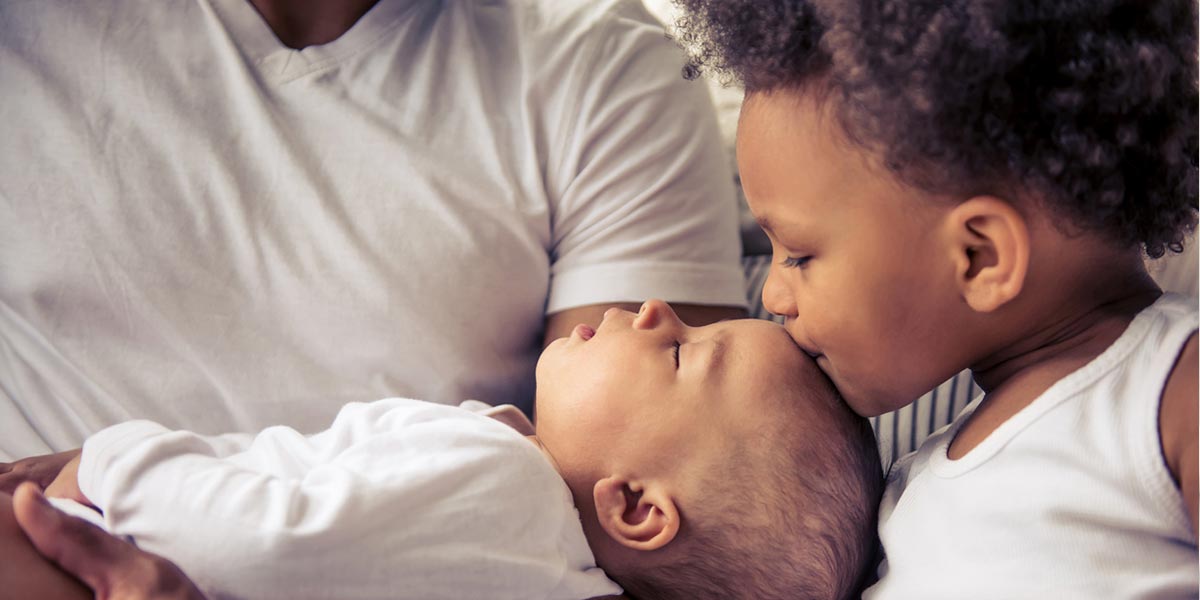The arrival of a wee baby brother or sister is bound to be a bit of a shock to your other children. And while the news may be hard for little minds to grasp, with a bit of preparation you can make it good news for everyone. The best tactic is to involve your child right from the word go. Let them touch your tummy and tell them about the baby growing inside – but don’t push the subject if they’re not interested. Show them where this new arrival will be sleeping and ask them for help with choosing newborn essentials, like clothes and toys.
Before your new baby arrives
While you or your partner are going through pregnancy there will be plenty of things you’ll want to get sorted for the new arrival. We’ve got some tips below to help you introduce your kids to the new brother or sister who’ll be joining the family.
Tip #1: Tell it like it is
Your children won’t be able to play with your new baby at first. So why not take them to visit other families with babies to help them learn what to expect. It’s also a good idea to tell them about the new arrival at the same time as you tell other people.
Tip #2: Keep things stable
Your children might be a wee bit anxious about how things might change when the new baby arrives. So let them spend time with the person who’ll be looking after them while you’re in labour. And reassure them - tell them that some things won’t change – like going to nursery or popping round to see gran on a Wednesday.
Tip #3: Plan well ahead
Make any changes, such as moving them from a cot to a bed, well in advance so they don’t feel put out. And it’s also best to avoid major changes, such as potty training or starting nursery, too close to the delivery date. Try to give them some sense of when the baby is due by talking about it arriving in the summer or after a holiday or their birthday. Kids under three have little idea of time.
Tip #4: Ask for their help

Once you’ve got your Baby Box, get them involved in colouring it in and making it beautiful for their new wee brother or sister. You could get them to help you unpack the box and chat to them about what’s in it.
After your new baby arrives
At first, your children might be more than a bit suspicious of the new arrival. Make sure you tell them again and again just how important they are to you, and how important they’re going to be to their new brother or sister.
Tip #1: First meeting
When your children meet their new brother or sister for the first time, it’s a good idea for the new baby to be in a cot rather than your arms. If they want to hold the baby, help them to do this – but don’t insist on it.
Tip #2: Be tolerant
If your older child says they hate the baby or want to send it back, don’t tell them off. It’s totally natural for them to feel a wee bit wary about this tiny person who has come into their life and stolen their parents’ attention. Understand their feelings and help them work through it. Say something like: ‘We can’t send the baby back. But don’t worry – I still love you just as much and I always will. And so will your baby brother/sister when he gets to know you”.
Tip #3: Praise your child
Sometimes other children get a bit babyish after a new sibling is born. They may want to suck from a bottle or the breast, start wetting themselves again, waking at night or having more tantrums. Ignore this behaviour and praise them at every opportunity for being a fab ‘big’ brother or sister.
Tip #4: Give them private space
You might want to give each child a private place to keep their things. And be careful when it comes to reorganising your home in preparation for the new arrival. You might have to move your child into a new room – but don’t frame it as ‘You have to move out for the new baby’. Instead, say something like ‘you’re getting much bigger now. I think you’d like sleeping in the bigger room.’
As the new baby gets older
If your kids are bickering, try not to feel too down about it. It’s normal for brothers and sisters to fight and it’s one of the ways they learn to share, take turns and get on with other people. Follow our tips below for defusing quarrels.
Tip #1: Give them one-to-one time
If you can, try to spend time alone with each of your children. It could be at bedtime, or when an older one is at school, or a younger one with granny for an hour or so. If they’re a bit older, you could ask them what they’d like to do with you for this time; it doesn’t need to be something you have to spend money on, or be complicated. Even reading with them for 20 minutes or doing some drawing together is a perfect chance to chat to them and make them feel special.
Tip #2: Be fair
When you’re feeling annoyed or frustrated with them, try not to compare your children or hold one of them up as an example. ‘Why can’t you be more like your brother/sister?’ is a tough thing to say to any child.
Tip #3: Put a stop to violence
If they’re trying to physically hurt each other, make it as clear as possible that you won’t put up with punching, kicking, biting and so on. When things get ugly, separate your kids calmly and get them to spend time in separate rooms to calm down.
Tip #4: Keep your cool
Try to remain calm. Don’t give your kids unnecessary attention for bad behaviour - they’ll continue to act up if you do.
Tip #5: Make expectations clear
Let your kids know that while you don’t expect them to be best pals the whole time, you do expect them to respect each other’s differences, and help them to understand that it’s better to share and talk things through rather than fight!
 Activities & Play
Activities & Play Behaviour
Behaviour Childcare
Childcare Development & Growing Up
Development & Growing Up Family, Friends & Relationships
Family, Friends & Relationships Feeding Your Baby
Feeding Your Baby Food & Eating
Food & Eating Health & Safety
Health & Safety Mental Health & Wellbeing
Mental Health & Wellbeing Money & Work
Money & Work Online Behaviour & Safety
Online Behaviour & Safety Pregnancy & First Days
Pregnancy & First Days School & Education
School & Education Sleep
Sleep








 Mental Health & Wellbeing
Mental Health & Wellbeing
 Sleep
Sleep